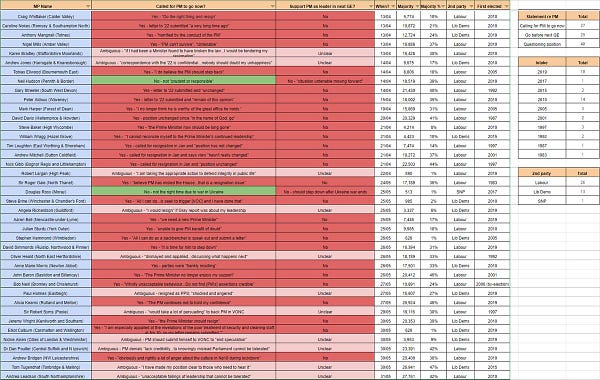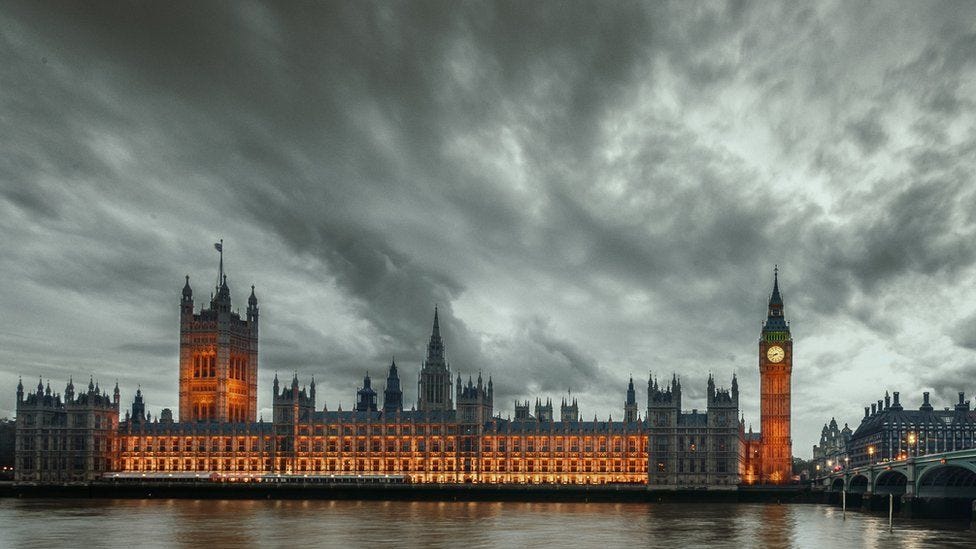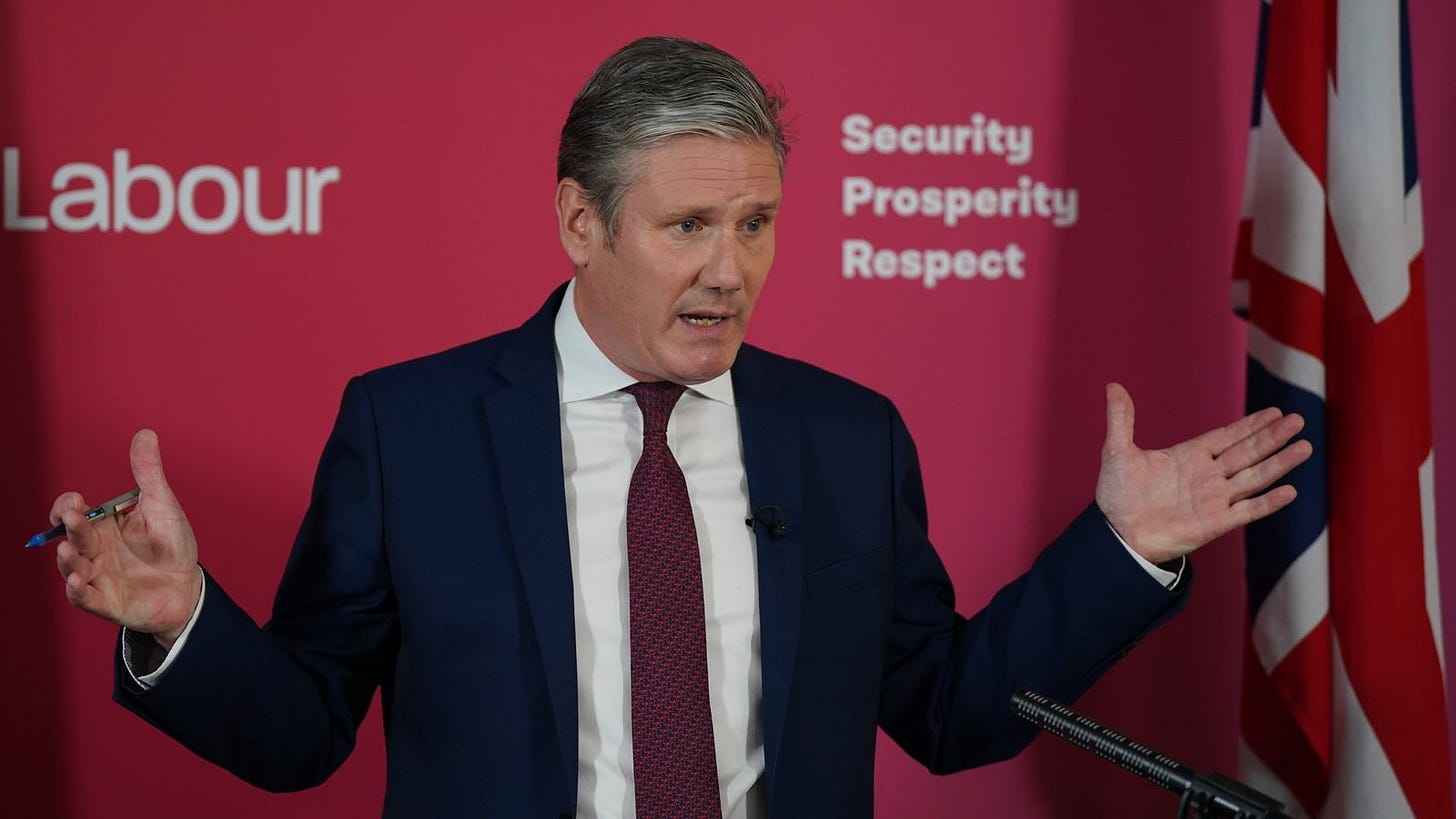Not a Windfall?
After 5 months, Sunak has finally designed an economic relief package partly funded by a £5bn ‘energy levy’ on exponential oil and gas profits. It is definitely not the long-desired Labour / Lib Dem policy of a ‘Windfall’ tax (clue: it is). The relief totals £15bn, guaranteeing £400 to all households, on top of £150 rebate and further means-tested support up to £1200. The opposition’s push for the tax was good politics, but after the government adopted their policy, now leaves them searching as they remember their lack of any serious policy or vision — bar their £28bn green energy investment plan (which everyone apart from Miliband has forgotten).
After incredible pressure (due to energy inflation caused by UKR / RUS war), the windfall tax and stimulus was obvious politics — especially after unexpectedly minimized borrowing (roughly £20bn less according to OBR) and increased tax receipts due to high inflation, has allowed for increased fiscal headroom. This has enabled Sunak to build a £30bn+ pre-election war chest, that is now being raided by Johnson and No. 10. The war between No. 10 and No. 11 continues, with Johnson forcing Sunak’s hand to spend now (rather than wait, which the Treasury wanted). Arguably, this was more dead cat than thoughtful politics in the week of Sue Gray, but intervention nonetheless.
As the FT stated, the Tory party is not forgetting it’s richer voters by awarding a universal £400 stimulus, as opposed to more targeted funding (such as Universal Credit uplift). The consensus is that the £400 will be both slightly more inflationary and less redistributive — but action was needed, and the government has acted. It’s unlikely, however, that the rest of Sunak’s election war chest will remain untouched throughout this cost-of-living crisis, or whether Sunak will even remain in No. 11.
Expect further economic developments and intervention as inflation nears 10% and recession looms.
No Gray, Go Away
Sue Gray week has been defined less by the report — which for most just confirmed the MET investigation / leaks — but more so by the actions surrounding the report. The Sunday Times found Boris Johnson, Simon Case and Steve Barclay, tampered with the report and pressured Gray to ‘water down’ sections. Questions have been raised over the Met not fining Johnson for several ‘work events’ where Johnson is seen raising a glass, even though others present were fined. Johnson was reportedly boasting and briefing about only getting one FPN early on. The Political Inquiry (TPI) finds this unusual, especially as Sajid Javid’s brother was involved in the MET investigation, although we are not suggesting there is any evidence of overt corruption… yet.
Johnson will now face the HoC Privileges Committee investigation over allegations of ‘misleading parliament’ — specifically surrounding the party on 13th November that he directly denied to the Commons. As now Johnson-enemy (and ex-attorney general) Jeremy Wright states, regardless if Johnson believed he was at a work event, if he had enough evidence to ascertain otherwise it can still be viewed as actively misleading parliament. TPI finds it hard to see a scenario in which Johnson escapes ‘misleading’ parliament, although it is a subjective topic (as most things are in Westminster). The committee has, obviously, a Tory majority. However, ignorance is not a defence against breaking the law and would be surprising if it worked in a parliamentary committee.
Labour will attempt to table several votes surrounding Sue Gray and the Committee’s conclusions (which will inevitably come to a vote, like Owen Paterson). This is potential dynamite for No. 10 as it heads into two key By-elections on the 23rd of June.
54 is the Magic Number
A minimal trickle of no confidence letters has seemingly turned into a steady flow. Several sources suggesting that 54 letters (which triggers a vote) has been reached. Notable names like Andrea Leadsom and ex-attorney general Jeremy Wright have openly criticised the PM. Up to 40 MPs have actively attacked Johson’s leadership. Expect a no confidence vote in the coming weeks as No. 10 will push to have it before the 23rd June — when the difficult Wakefield / Tiverton and Honiton by-elections will occur. If the vote is held soon, Johnson may scrape through. But recent polls showing Labour’s lead extend to 10+ points may push Tory MPs into ousting Johnson fast.


If Johnson wins the vote, he will be safe for a year and probably lead the party into another general election. However, after horrific Local Elections, collapsing opinion polling and a spectre of double-defeat in upcoming (and important swing seat) by-elections, Tory MPs could oust Johnson. Tory MPs always find backbones when their self-interest is threatened. Rebels would need to reach 180 votes to bring down the PM. Considering its secret ballot, anyone (including the cabinet / payroll) could vote against Johnson. If, however, the entire payroll vote for Johnson, he has 138 votes, needing just 42 backbenchers to vote for him. The vote will be incredibly tight, and is almost impossible to call. The line between survival and capitulation can be thin, especially in the gossip-fuelled Westminster bubble. A predicted victory, could easily slide into an embarrassing defeat for Johnson, especially with further developments imminent.

Although, this in itself is a sad mark of Johnson’s premiership that scraping a no confidence motion is considered a ‘victory’.
Starmer’s Last Stand
On the 31st May, Sir Keir Starmer and deputy leader Angela Rayner received police questionaries from Durham Police. Only suspects that the police believed had a high chance of guilt (and thus an FPN), were sent these in the MET investigation into No. 10. While Starmer’s pledge to resign is good for a sense of morality in UK politics, it will mean the end of his leadership… for now. The investigation is still in the balance, with Labour confident of being cleared — even sending copious amounts of ‘evidence’ supposedly proving that Labour and Starmer were working until late that evening.
Could we really be witnessing the end of both main party leaders? The last time this happened was in 1963 when Macmillan (Con) resigned, and Hugh Gaitskell (Lab) died leading to Alec Douglas-Home and Wilson.
Lebedev Returns (State of Play #3)
As reported in the Private Eye (1574), the Canadian government has imposed sanctions on Lebedev due to his status as a “close associate of the Putin regime”. The government is supressing MI5 information on Lebedev to be released via a Commons instruction, raising the question of why Lebedev is even allowed to remain in the House of Lords? TPI understands that information is being supressed due to national security worries, or more accurately Johnson’s questionable friendship with the Lord of Siberia. The age of the ‘Laundromat’ of Europe (London) continues, as Oliver Bullough illustrates in Butler to the World.
The Political Inquiry into the summer…
Moving into the Summer, and beyond, TPI will be transitioning into a broader range of writing, and writers, with a greater focus on ideas and debate, as well as our usual analysis. Please do comment / email in if you have any desired topics, theories, policies, trends (etc) that you want discussed. As always, if you enjoy the writing please do share, it really helps!







